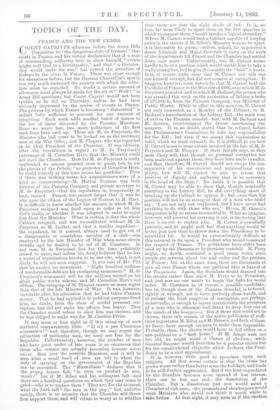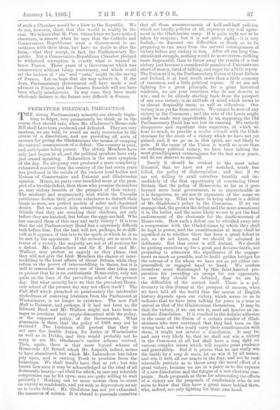TOPICS OF THE DAY.
FRANCE AND THE NEW CRISIS.
COUNT CAPRIVI'S allusions before the Army Bills Committee to " the dangerous state of ferment" that exists in France, and his virtual declaration that if a man of commanding authority were to show himself, "events might well lead to a Dictatorship," and that "a Dictator- ship would make for war," has turned the attention of Europe to the crisis in France. There was cause enough for uneasiness before, but the German Chancellor's speech has very much increased the anxiety with which the situa- tion must be regarded. No doubt a certain amount of allowance must always be made for the cry of " Wolf ! " in Army Bill speeches ; but Count Caprivi would not have spoken as he did on Thursday, unless he had been seriously impressed by the course of events in France. The process by which France is becoming " dismanned" is indeed fully sufficient to account for any amount of misgiving. Each week adds another batch of names to the list of those devoured by the Panama Minotaur. Since we wrote last, two more politicians of the first rank have been used up. These are M. de Freycinet, the Minister who had come to be looked on as the necessary man at the War Office ; and M. Floquet, who was regarded as an ideal President of the Chamber. It was obvious, after the revelations in regard to M. de Freycinet's patronage of M. Cornelius Herz, that the Minister could not meet the Chamber. How far M. de Freycinet is really implicated we cannot pretend even to guess, but, to use the phrase of the De'bats, "as protector of Cornelius Herz, he could scarcely at this time retain his portfolio." Even if there was nothing worse, his acquaintances were of a kind so compromising—M. Marius Fontane was both director of the Panama Company and private secretary to M. de Freycinet—that his reputation is, temporarily at least, stained. France, too, cannot forget that it was he who gave the ribbon of the Legion of Honour to M. Herz. It is difficult to know whether the manner in which M. de Freycinet resigned was fixed, upon in order to let him down easily, or whether it was adopted in order to expel him from the Ministry. What is certain is that the whole Cabinet resigned, and was reconstituted without M. de Freycinct or M. Loubet, and that a similar expedient— the expedient, be it noticed, always used to get rid of a disagreeable or scandalous member of a club—was employed by the late Minister of War when some eleven months ago he desired to be rid of M. Constans. In any case, M. de Freycinet has for the time, politically ceased to exist, and unless the Army believes that he has a secret of organisation known to no one else, which is not likely, he will not soon reappear. It was said of Mr. Pitt that he needed no monument. "Eight hundred millions of irredeemable debt are his everlasting monument." M. de Freycinet's monument will be the millions wasted on his great public works scheme, and M. Cornelius Herz's red ribbon. The using-up of M. Floquet causes us more regret than that of the late Minister of War. It was, however, inevitable after his admission that he had taken Panama money. That he had applied it to political purposes freed him, no doubt, from the stain of sordid personal cor- ruption, but did not make his offence less heavy. That the Chamber would refuse to elect him was obvious, and he was obliged to make way for M. Casimir-Wrier.
It may seem at first sight as if this using-up of men mattered comparatively little. "fl n'y a pas d'hommes n&essaires !" and therefore, though we may regret the extinction of particular men, we need not fear for the Republic. Unfortunately, however, the number of men who have gone under of late years is so enormous that those who remain are actually becoming hommes nikes. sai?es. Run over the possible Ministers, and it will be seen what a small band of men are left to whom the duty of carrying on the government of the Republic can be entrusted. The "Marseillaise" declares that if the young heroes fall, " la terre en produit de nou- veaux ;" but if M. Ribot and his colleagues fall—and there are a hundred questions on which they may come to grief—who is to replace them ? They are, for the moment, what the Irish call "the men in the gap ;" but, unfortu- nately, there is no security that the Chamber will there- fore support theme And will refuse to worry as to whether their coats are just the right shade of red. It is, we fear, far more likely to upset them on the first question in which to support them "would involve a logical absurdity.' Where M. Carnot would find a Cabinet capable of keeping order in the streets if M. Ribot's Ministry were to be upset, it is impossible to guess,—unless, indeed, he appointed dozen Admirals and Major-Generals to carry on the work. of the departments till France and the Chamber had settled down once more. Unfortunately, too, M. Carnet seems hardly to be in a position which would enable him to take a really stron g line, and to give the country the "lead" it wants. It is, of course, quite clear that XL Carnot not only was not himself corrupt, but did not connive at corruption. It. happens, however, most unluckily, that M. Carnot held the Portfolio of Finance in theMinistry of 1886, over which M. de Freycinet presided, and in which M. Balhaut, the person who was arrested this week on the accusation of taking a bribe of 375,000 fr. from the Panama Company, was Minister of Public Works. While in office on this occasion, M. Carnot not only consented, as a Member of the Cabinet, to 31. Balhaut's introduction of the Lottery Bill— the main root of evil in the Panama scandal—but, with M. Baihaut and M. Sarrien, countersigned the decree sanctioning the measure. It is, no doubt, stated that he refused, before the Parliamentary Committee, to take any responsibility, for the Bill ; but even if we accept this explanation as valid, which we most certainly do, it is difficult to see how M. Carnot is not to some extent involved in the fate of M. de. Freycinet and M. Floquet. If their friends urge, as they most likely will, that though no personal corruption has been made out against them, they have been made to suffer, and that, therefore, M. Carnot should not escape the con- sequences of his unconscious and unintentional com- plicity, how will M. Carnot be able to retain that position of dignity and authority that is so necessary in the head of the State ? No doubt it is possible that M. Carnot may be able to show that, though nominally assenting to the Lottery Bill, he did everything short of breaking up the Cabinet to oppose it ; but even then his position will not be as strong as that of a man who could say I am not only not implicated, but I have never had anything to do with those who are.' Hence, M. Carnot's resignation is by no means inconceivable. What we imagine,. however, will prevent his carrying it out, is the feeling that there is no one to replace him. M. Carnot is essentially patriotic, and he might well feel that anything would be better just now than to throw down the Presidency to be scrambled for. It would be extraordinarily difficult at this moment to fix upon a President who would command the respect of France. The politicians have either been' used up by the Panama or by previous scandals. M. Ferry might, no doubt, command a good many votes, since people are nervous about law and order and the position of France ; but at the same time, there are thousands of men all over France whose one political idea is hatred of the Tonquinois. Again, the Socialists would descend into the streets rather than allow 31. Ferry to be President, and just now no one wants to begin the fight for social order. M. Constans is, of course, a possible candidate ; but he, though clear of the Panama Scandal, is believed,. rightly or wrongly, not to have perfectly clean hands, and at presesit the least suspicion of corruption, not perhaps unnaturally, is enough to injure irretrievably the prospects. of a man who is otherwise well fitted to keep fear out of the minds of the bourgeoiRie. But if these men could not be chosen, there only remain of the active politicians of suffi- cient importance M. Ribot and M. Brisson, and both of them, we fancy, have enough enemies to make them impossible. Probably, then, the choice would have to fall either on a noh-political or a "dark horse." If M. Arago were not too old, he might stand a chance of election ; while General Saussier would doubtless be a popular choice but for the constitutional etiquette which declares the Presi- dency to be a civil appointment. It is, however, little good to speculate upon such subjects. All that seems certain is that the crisis has grown worse rather than better since the holidays, and tends to be still further aggravated. But if the heat engendered by the Scandals becomes more instead of less intense, there can be but one end,—the dissolution of the Chamber. But a dissolution just now would mean a Chamber of rich men,—the peasants and shopkeepers would want Members who would not think it worth while to take bribes. At first sight, it may seem as if the election of such a Chamber would be a blow to the Republic. We do not, however, think that this would in reality be the case. We believe that M. Pion, whose letter we have noticed elsewhere, is sincere when he says that the Catholic and Conservative Republicans want a Government in ac- cordance with their ideas, but have no desire to alter the form,—that they accept, in fact, the Parliamentary Re- public. But a Conservative-Republican Chamber pledged to withstand corruption is exactly what is wanted to brace France. Three years of a Government which was conservative without being reactionary, and which could set the fashion of "ins" and "outs," might be the saving of France. Let us hope that she may achieve it. If she does, Parliamentary Government will have made a real advance in France, and the Panama Scandals will not have been wholly mischievous. In any case, they have made wholesale bribery in the future very difficult in France.



































 Previous page
Previous page